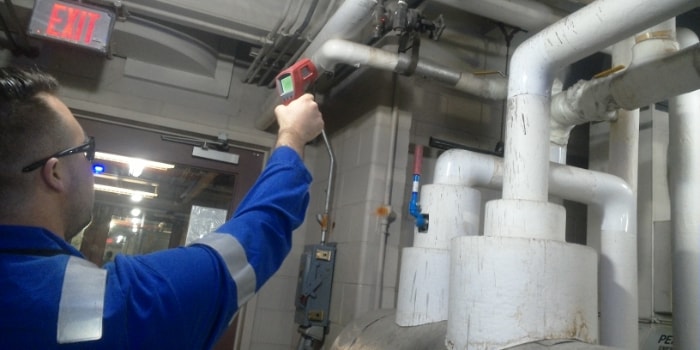Steam System Audit

Undergo a Steam System Audit. Reduce Energy Loss.
Find out where your plant is losing energy with a thorough steam system audit conducted by Swagelok specialists. By harnessing state-of-the-art techniques and relying on years of steam and condensate systems industry expertise, our experts will help you conduct a detailed assessment of your plant’s steam systems and components, document and tag areas needing attention, and share best practices for repairing and maintaining your facility’s systems.
As a result of undergoing a steam system audit, organizations commonly experience:
- Higher product quality
- Less production downtime
- Reduced energy costs
- Reduced emissions
- Lower maintenance expenses
- Improved worker safety
- Assured performance in line with design specifications
- Bottom-line increases in productivity, with lower operating costs
Today’s competitive marketplace demands that steam and condensate systems perform in line with world-class standards. Work with Swagelok field engineers to start performing accordingly and saving money in the process.
Case Study: Steam System Evaluation Helps Refinery Drastically Reduce Steam Loss, Maintenance, and Component Spend
Customer
Petroleum refinery. “How do we conduct steam tracing processes safely and effectively, while staying on budget?”
Challenge
Steam tracing of process piping carried out as part of plant winterization efforts was consuming a considerable amount of time and money, yet yielded mediocre results and created safety and process issues in portions of the plant.
Need
A winterization plan that was safer, more reliable, and less resource-intensive. They also needed data to justify the new plan.
Solution
- Swagelok field engineers conducted an evaluation of the steam tracing system and winterization efforts
- The energy coordinator was provided with a detailed report outlining how to achieve his goals, as well as a plan for eliminating costly steam losses and related risks
Result
- The report identified $700,000 in steam loss per year
- The evaluation also identified more than $500,000 of recurring annual component spend that could be avoided through system improvements
- Implementation of the plan saved an estimated 100 hours of maintenance time per year, while improving safety and process reliability
